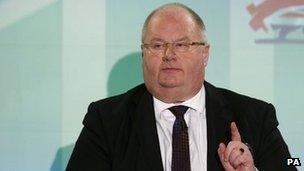Queen's Speech: Abolition of Audit Commission to be completed
- Published

Communities Secretary Eric Pickles has said the commission was "once a great organisation"
A bill to complete the abolition of the Audit Commission, which oversees spending by local government and NHS Trusts in England, has been announced in the Queen's Speech.
The process of abolishing the body began in 2010, but was delayed as officials worked out how to replace it.
Ministers believe that the commission's closure will save taxpayers money.
But MPs have previously warned that the arrangements replacing it will not save as much as the government predicts.
The commission's in-house audit team was outsourced in 2012, but the residual commission currently continues to have a role in contracting private-sector auditors to perform the tasks it once undertook itself.
Veto
The Local Audit and Accountability Bill, if passed by Parliament, will replace the remnants of the commission with a new system of local auditing.
Local authorities will need to set up independent panels to make recommendations on who should audit them.
Should councillors opt to veto their panel's recommendations and make their own arrangements, they will have to explain why they have done so in a public statement.
Under the plans, the smallest local public bodes - those spending less than £25,000 a year - will no longer be audited.
The government anticipates that those with marginally higher budgets - largely parish councils - that might nonetheless struggle to afford commercial auditors by themselves will be able to join a new scheme enabling them to buy auditing services in bulk.
Communities Secretary Eric Pickles said: "This government is reining in the quango state, saving taxpayers' money and giving more power to local people."
'Propaganda'
The government believes the reforms will be completed by 2015, cutting public spending by £1.2bn over 10 years.
It aims to maintain the principle that local government auditors must publish "public interest reports" on any serious financial irregularity that comes to their attention, regardless of whether they have been commissioned to look at it, by enabling them to recover "reasonable costs" from the body being audited in such cases.
Ministers also plan to use the legislation to clamp down on local authorities which fall foul of rules governing how they present newsletters to the public.
Under the Code of Recommended Practice on Local Authority Publicity, councils are not meant to distribute material which "emulates commercial newspapers in style or content".
"All local authority publicity should clearly and unambiguously identify itself as a product of the local authority," the code continues.
Better enforcement of the code will "protect the independent free press from unfair competition by town hall newspapers and propaganda", ministers believe.
But Local Government Association chairman Sir Merrick Cockell warned that this measure could have a "profound impact" on how councils communicate with their constituents.
"We've simply not been shown any evidence council publications compete unfairly with local newspapers, and government couldn't find any when it looked into the issue two years ago," Sir Merrick said.
"Before any decision is made on legislation surely an independent review should be undertaken to establish what, if any, impact council publications have on local newspapers."
'Past glories'
The bill also aims to extend referendum powers, enabling taxpayers to block "excessive" tax rises in those parts of the council tax bill determined by local public bodies such as waste disposal authorities and internal drainage boards.
The government published draft legislation containing its reform plans in 2012, which faced extensive scrutiny from a committee of MPs.
The ad hoc committee on the draft Local Audit Bill, comprising MPs with expertise in the field, criticised the government's estimate of the potential savings from their reforms, which they warned could prove to be much lower than predicted.
The principle that those commissioning the auditors needed to be independent from those being audited has "guided public sector audit for the last 150 years", the committee added.
The MPs urged the government not to abandon this principle as it replaced the Audit Commission.
In late 2012, the commission's 700 in-house auditors were transferred to private-sector firms. Before that, the commission had been outsourcing 30% of its auditing work.
Announcing his decision to abolish the commission in 2010, Mr Pickles told MPs: "It was once a great organisation, and it did make a change to local government."
But the watchdog could not carry on "living on past glories", he said.
- Published17 January 2013
- Published31 March 2011
- Published22 February 2011